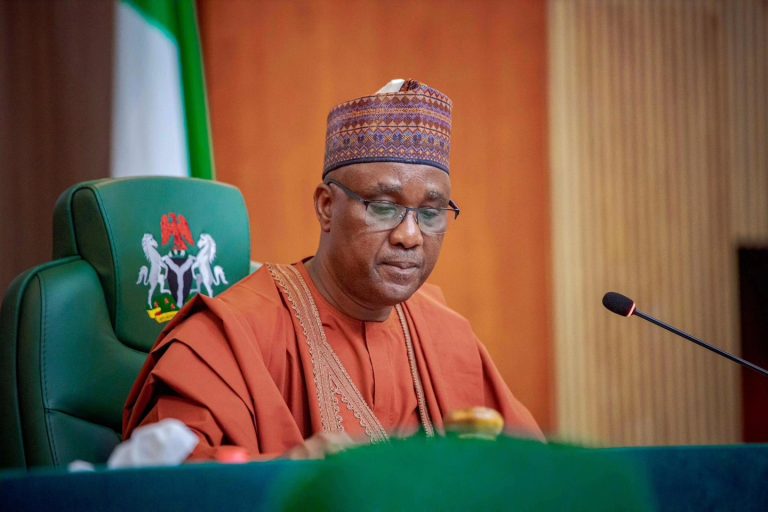• Over 60% of our land degraded, says Songhai Farms founder
The Speaker of the House of Representatives, Abbas Tajudeen, has said food security is a fundamental right of citizens and not a privilege.
Abbas said this in his keynote remarks as guest of honour at the 22nd Annual Daily Trust Dialogue with the theme: “Food security: Availability or affordability?” in Abuja, yesterday.
He assured Nigerians of the National Assembly’s unwavering commitment to enacting legislation that will boost agricultural production and ensure food security nationwide.
The Speaker, who was represented by the House Committee Chairman on Nutrition and Food Security, Dike John Okafor, said the National Assembly was committed to a comprehensive allocation for nutrition and food security programmes in the country.
“One of the things we do at the National Assembly is to network with the states and local governments across the country, so we can be on the same page to make good food available and affordable to our people.
“Again, we will continue to hold key players in the agricultural value chain to account.
“So, NASS is poised to ensure food availability and affordability in Nigeria in line with the renewed hope agenda of President Bola Tinubu,” he said.
He lamented that Nigerians faced high rates of malnutrition, particularly among the children, with a significant proportion of them suffering from stunted growth and micronutrient deficiencies.
He agreed that there was a need for a paradigm shift in food governance in the country and assured Nigerians that the Parliament would champion strategic funding for food production in Nigeria.
“We have committed to enacting policies that support farmers with subsidies, access to credit, and modern farming techniques and inputs. We also aim to develop legislation that promotes digital innovation, data protection, and e-commerce, while enhancing Nigeria’s export potential and reducing dependency through unnecessary imports.”
He emphasised the need for collective efforts to address food insecurity and called on the young people, especially, to take the lead in driving the vision to address food insecurity by actively engaging in agriculture.
“I believe that we must collectively strive to enhance agricultural production, lower costs, and build the infrastructure needed for the agricultural and allied sectors to thrive. I do not believe that food security is a privilege. It is a fundamental right. No citizen of our dear country should go to bed hungry because of the contest between availability and affordability.
“With the right focus, which is now being driven by the renewed hope programme and keenly supported by our legislative agenda, I firmly believe that food insecurity in Nigeria will become history. We are not far from achieving this.
“I therefore expect that the robust discussion here today will enrich us with actionable points that will help our resolve to collectively address the issue of food insecurity in our country. For us in the House of Representatives, we are ready to partner with the media on any legislation that may arise from this dialogue to ensure food security in Nigeria,” he said.
In his contribution, Reverend Father Godfrey Nzamujo, founder and director general, Songhai Farms, Benin Republic, said one of the challenges militating against food production in Nigeria is because 60-70 percent of the land is degraded.
She said at Songhai Farms efforts were ongoing to tackle the menace.
He said agriculture could be a weapon of mass production, adding that people from Europe and across the world have visited his farm to study the model which is being used to run the place.
Nzamujo said everything used at the farm is sourced within, charging farmers to take advantage of the ample opportunities provided by nature.
Former Governor of Niger State, Dr Mu’azu Babangida Aliyu, said no state in North Nigeria has 50 per cent qualified teachers.
The former governor also questioned the wisdom behind border closure, saying despite the closure, goods from Nigeria find their way to other ECOWAS nations.
He urged the ministry of livestock to partner with universities of education and agriculture to educate farmers.
“What is the importance of closing borders? What is the importance of that while the population of Nigeria is almost the population of other ECOWAS members? And every market you go to in ECOWAS countries you will discover that more than half of the things in that market are from Nigeria.
“For example, in Niger the cow is still cheaper than in Nigeria. Apart from the inflation, it has always been like that because we used to send people there on good days to get these cows either for slaughter or Sallah. Why is this so? Please, do what you have to do. Do also the education.
“The second thing I am pursuing is education. In the northern states, there is no state with 50% qualified teachers. Even those who are attending the schools now, let alone those who are not able to attend school. Use federal universities of Agriculture and universities of education to educate people. We need education to have people who are passionate about a particular thing.”
Speaking earlier, the chairman of Media Trust board of directors, Malam Kabiru Yusuf, lamented that statistics in Nigeria paint a grim picture of food security in the country.
“Why are our citizens not having enough food to eat? This is why we are here. That is the question. Statistics in Nigeria paint a grim picture and the anecdotal evidence. look around you. We may change things we take for granted.
“We have to look at this issue. How do we cross this divide, if it exists. I don’t know what the expert will say between availability or affordability. We are not producing enough because people cannot afford it.”
